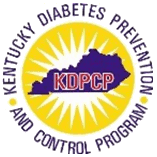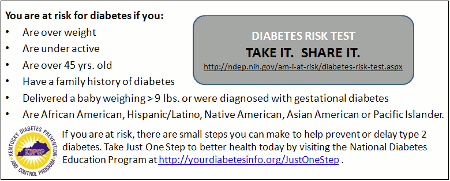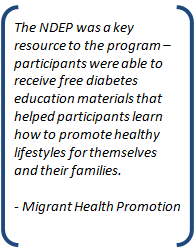What’s New RSS Feed Help with RSS
March Partner Spotlight
Mar 01, 2013
Background
 The Kentucky Department for Public Health’s
Diabetes Prevention and Control Program
(KDPCP) is a public health initiative consisting of a network of state, regional
and local health professionals whose mission is to reduce new cases of diabetes
as well as the sickness, disability and death associated with diabetes and its complications.
The Kentucky Department for Public Health’s
Diabetes Prevention and Control Program
(KDPCP) is a public health initiative consisting of a network of state, regional
and local health professionals whose mission is to reduce new cases of diabetes
as well as the sickness, disability and death associated with diabetes and its complications.
Outreach and Promotions
In observance of American Diabetes Association® Diabetes Alert Day 2012, the KDPCP used NDEP’s Diabetes Alert Day campaign resources to raise awareness of diabetes, diabetes risk factors, and behavior change messages to its network of more than 600 partners, including employers, health plans, health care professionals, hospitals and health centers, faith communities, professional associations, universities, and state and local diabetes coalitions. As a result of the KDPCP’s Diabetes Alert Day outreach and partner collaborations, many partners also promoted Diabetes Alert Day to their own networks – reaching an even larger audience.
To kick off Diabetes Alert Day outreach efforts, the KDPCP promoted NDEP’s Diabetes Alert Day resources by distributing the March issue of NDEP’s News & Notes, encouraging readers to add NDEP’s Diabetes Alert Day e-signatures to their email, use NDEP’s prewritten Facebook and Twitter messages, and post NDEP’s Diabetes Alert Day web buttons to their websites. Many of the KDPCP’s partners reported using these easy, budget-friendly ways to raise awareness of diabetes risk factors and resources – such as NDEP’s Just One Step tool – to help people make lifestyle changes to prevent type 2 diabetes.
The KDPCP and its partners also distributed NDEP’s Diabetes Alert Day press release through a variety of outlets across Kentucky. For example, the KDPCP submitted the press release to state media outlets including 149 newspapers, 126 radio stations, and 29 television stations. Additionally, the KDPCP encouraged partners to adapt and localize the release for their own communities. Partners reported that they submitted the release to their local newspapers, published it in their member/employee/consumer newsletters, shared it on their organizations’ websites, and distributed it to clients including pharmacies, senior centers, and hospitals.
 Other promotions included sharing NDEP’s Diabetes Alert Day messages through presentations,
bulletin and electronic marquee boards, screening events, and church bulletin inserts.
The KDPCP also distributed Diabetes Alert Day messages in a payroll stuffer distributed
to 35,000 state employees (see example to the left).
Other promotions included sharing NDEP’s Diabetes Alert Day messages through presentations,
bulletin and electronic marquee boards, screening events, and church bulletin inserts.
The KDPCP also distributed Diabetes Alert Day messages in a payroll stuffer distributed
to 35,000 state employees (see example to the left).
Evaluation
To evaluate Diabetes Alert Day outreach efforts, the KDPCP used a web-based reporting system to collect and monitor information about activities and potential exposure to Diabetes Alert Day messages. In March 2012, there were 174 total activities implemented, reaching an audience of more than 1,314,255 people.
For more information about the Kentucky Department for Public Health’s Diabetes Prevention and Control Program, visit http://chfs.ky.gov/dph/info/dpqi/cd/diabetes.htm or contact Reita Jones at Reita.Jones@ky.gov. Also be sure to visit www.YourDiabetesInfo.org/AlertDay2013 for resources you can use to promote Diabetes Alert Day 2013 in your community.
Diabetes Alert Day
Feb 15, 2013
American Diabetes Association Alert Day®, observed annually on the fourth Tuesday in March – Tuesday, March 26, 2013 – is a one-day wake-up call to inform the American public about the seriousness of diabetes, particularly when diabetes is left undiagnosed or untreated.
In observance of Diabetes Alert Day, the National Diabetes Education Program (NDEP) is encouraging people to find out if they are at risk for type 2 diabetes by taking the Diabetes Risk Test and talking to their family about their family history of diabetes. If left undiagnosed or untreated, diabetes can lead to serious health problems including heart disease, stroke, blindness, kidney disease, amputation, and even death.
Visit www.YourDiabetesInfo.org/AlertDay2013 for tools you can use to help people learn about their risk for type 2 diabetes, including the Diabetes Risk Test, Family Health History Quiz, and the 4 Questions You Should Ask Your Family about Diabetes and Family Health History tool.
You can also find promotional tools you can use to promote Diabetes Alert Day in your community, including a template press release, feature articles, web buttons, email signatures, social media messages, and more.
American Heart Month
Feb 01, 2013
February is American Heart Month, a great opportunity to raise awareness about what Americans can do to live heart-healthy lives. For people with diabetes, it is particularly important to take care of your heart because having diabetes means you are more likely to have a heart attack or a stroke—but it doesn’t have to. People with diabetes can take steps to lower their chances of developing heart disease and other heart problems by managing their ABCs of diabetes – A1C, Blood pressure, and Cholesterol.
Visit www.yourdiabetesinfo.org/heart for resources to help you raise awareness about the ABCs of diabetes and the link between diabetes and your heart, including a new infographic that explains why it’s important to take care of your heart if you have diabetes, and steps you can take to lower your risk for heart problems.
February Partner Spotlight
Feb 01, 2013
Background
Migrant Health Promotion (MHP) builds on community strengths to improve health in
farmworker and border communities. MHP’s programs provide peer health education,
increase access to health resources, and bring community members together with health
providers, employers, and policymakers to create positive health changes. MHP's
great work demonstrates how community leaders, called Promotores and
Promotoras,
 can provide inspiration, direction, and vision necessary to build stronger, healthier
communities.
can provide inspiration, direction, and vision necessary to build stronger, healthier
communities.
Outreach and Promotions
With support from the Texas Department of State Health Services' Diabetes Program and resources from the NDEP, Migrant Health Promotion implemented a “Promotora Community Program” (PCP) in Hidalgo County, Florida. The goal of the PCP is to promote healthy lifestyle changes by educating community members about their risk for type 2 diabetes and ways to prevent or manage the disease through healthy eating and physical activity.
As part of the PCP, Migrant Health Promotion used NDEP tools to coordinate activities
that are culturally and linguistically appropriate to the population served by MHP.
For example, the program organized cooking and nutrition classes using recipes from
NDEP’s Más que comida, es vida. (It's more than food. It's Life.) bilingual (English
 and Spanish) recipe book, teaching people how to how make traditional Mexican food
with healthier, diabetes-friendly ingredients. The program also used NDEP's bilingual
The Road to Health Toolkit and
Movimiento por su vida music CD to host diabetes
health education sessions and exercise groups focused on encouraging people to make
healthy behavior changes like eating more fruits and vegetables, reading food labels
when grocery shopping, drinking water instead of sugary drinks, and tips for making
physical activity a part of their daily lives.
and Spanish) recipe book, teaching people how to how make traditional Mexican food
with healthier, diabetes-friendly ingredients. The program also used NDEP's bilingual
The Road to Health Toolkit and
Movimiento por su vida music CD to host diabetes
health education sessions and exercise groups focused on encouraging people to make
healthy behavior changes like eating more fruits and vegetables, reading food labels
when grocery shopping, drinking water instead of sugary drinks, and tips for making
physical activity a part of their daily lives.
As of August 2012, MHP conducted more than 100 sessions with a total of more than 1,500 program participants. Participants reported that their knowledge of diabetes and the importance of healthy eating and physical activity increased, noting that they have started making better food choices and being more active. One participant added, "If it wasn't for the PCP, I would have never made the time to exercise. Since I have joined the exercise group, I feel more motivated, more energetic, and agile."
For more information about Migrant Health Promotion and the Promotora Community Program, visit www.migranthealth.org or contact Colleen Reinert at creinert@migranthealth.org.
January Partner Spotlight
Jan 04, 2013
Background
Newton Medical Center (NMC) is a not-for-profit facility dedicated to providing health care services to residents of Harvey, Kansas and surrounding counties, regardless of race, color, sex, age, religion or ability to pay. In support of National Diabetes Month 2012, NMC partnered with community organizations and the NDEP to raise awareness of diabetes and the importance of making lifestyle changes to prevent type 2 diabetes or manage the disease to prevent complications.
Outreach and Promotions
Newton Medical Center and supporting partners sponsored several events during November to promote the theme, “Give Thanks! I Can Help Prevent Diabetes in Myself.”
 To kick off the month, NMC hosted Dinner with the Doctor, a diabetes prevention
panel discussion open to the general public that featured presentations by a family
practice physician, obstetrician/gynecologist, and Certified Diabetes Educator (CDE).
In addition to enjoying a diabetes-friendly dinner, attendees were able to ask questions
about type 2 diabetes prevention and receive educational materials. During the event,
NMC distributed NDEP’s
Prevent Type 2 Diabetes. Step by Step.,
More than 50 Ways
to Prevent Diabetes, and
It’s Never Too Early to Prevent Diabetes tip sheets.
To kick off the month, NMC hosted Dinner with the Doctor, a diabetes prevention
panel discussion open to the general public that featured presentations by a family
practice physician, obstetrician/gynecologist, and Certified Diabetes Educator (CDE).
In addition to enjoying a diabetes-friendly dinner, attendees were able to ask questions
about type 2 diabetes prevention and receive educational materials. During the event,
NMC distributed NDEP’s
Prevent Type 2 Diabetes. Step by Step.,
More than 50 Ways
to Prevent Diabetes, and
It’s Never Too Early to Prevent Diabetes tip sheets.
Newton Medical Center Primary Care Clinic employees led two “walkabouts” throughout the month to encourage regular exercise. Clinic employees invited the area’s Chambers of Commerce, as well as city leaders, community members, and the local elementary school to join the walks at a local park. A number of hospital employees also led walkabouts along hospital walking paths. Participants received the NDEP’s Small Steps. Big Rewards. Your GAME PLAN to Prevent Type 2 Diabetes booklet as a prize. Children also received NDEP’s Tips for Kids: How to Lower Your Risk for Type 2 Diabetes.
To follow up on this effort, NMC arranged to have CDEs give a presentation to the Chambers of Commerce titled, “Fifteen Minutes to Effective Carb Counting – Help Prevent the Onset of Diabetes” and distributed NDEP’s More than 50 Ways to Prevent Diabetes tip sheet.
Newton Medical Center also coordinated roundtable discussions with doctors and CDEs targeting patients at risk for type 2 diabetes. Doctors mailed their at-risk patients personal letters inviting them to join the roundtable discussions to talk about steps they can take to prevent type 2 diabetes or manage it to prevent complications. To guide the discussions, doctors used NDEP’s Prevent Type 2 Diabetes. Step by Step. tip sheet and The Road to Health Toolkit.
Additional activities during the month included healthy cooking classes hosted by dietitians, and collaborations with other health care facilities, ministries, and community organizations to distribute NDEP materials to at-risk audiences.
Newton Medical Center promoted National Diabetes Month events via the NMC website, electronic signs at the hospital and along the highway, posters in the hospital lobbies, and local media using resources from NDEP’s National Diabetes Month promotional toolkit.
For more information, contact Vallerie Gleason at val.gleason@newmedctr.org.
